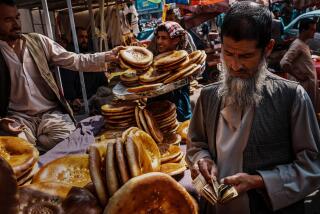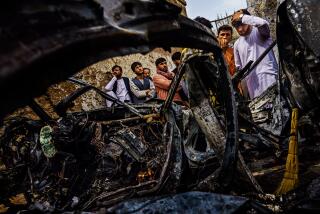Bombed and Darkened, Kabul Is a City in Fear
- Share via
DENOU, Afghanistan — For Kabul resident Khan Jan, the U.S.-led bomb strikes Sunday were the most terrifying thing he has endured in his 64 years.
When the bombs fell in the Afghan capital, he said, the power went off and the first thing many residents did was go outside and look at the sky.
Khan Jan wasn’t among them. He remained huddled in his air raid shelter, listening to the deafening sounds of the bombing, which hit the city in three waves, and the antiaircraft gunfire.
“Everyone was frightened,” he said after fleeing Kabul on Monday morning for this northern Afghanistan town. “If you had been there, you would have been frightened too.
“We all hid in the basements. We heard the bombing. It was very loud and intense.”
In the slow buildup to the airstrikes, Kabul residents had been glued to their radios, but there was no good news. Instead, the broadcasts warned local people that Afghanistan had been given a 72-hour ultimatum to hand over Osama bin Laden--accused by the U.S. of masterminding the attacks against New York and the Pentagon last month--or face bombing.
“The Americans gave us a 72-hour deadline--and then they bombed us,” Khan Jan said. It was not clear if such an ultimatum had been given.
It was still dark when Khan Jan left the city, and there was panic and weapons fire.
“People were trying to run away,” he said. “They were trying to hide, wherever they could.”
On Monday, for a second night, U.S. missiles and bombs hit targets in Kabul and other parts of Afghanistan.
After two nights of U.S.-led airstrikes, Kabul has become a terrifying city for those who cannot scrape together the money to leave. And for those fleeing now, the flight to safety has been complicated by a severe shortage of transport.
The streets of Kabul, which had been eerily empty in the days before the strikes, were filled with people, mainly ethnic Pushtuns, heading east to Jalalabad, toward Pakistan. But in Jalalabad, also hit by airstrikes, fighters with the extremist Islamic Taliban regime were reportedly preventing refugees from leaving the city Monday for Pakistan.
With the streets of the capital bare but for refugees, the biggest problem for the people leaving the capital was finding a car.
Most of those who have cars and could afford to leave the city had already left, leaving behind widows, the elderly and others in poverty.
As he drove out of the city, Khan Jan surveyed the bomb damage. He said U.S. forces had bombed the airport, a TV tower and the Hotel Continental north of the city near the Taliban front line.
“Lots of Taliban commanders stay in that hotel,” he said. “Maybe there were some civilians killed too.”
Although the Taliban announced Monday that 20 civilians died when houses near the airport were hit, there has been no confirmation of that figure. Officials of the Northern Alliance, which opposes the Taliban, said they had no information on civilian casualties.
Only a trickle of refugees left the city heading north, toward territory held by the Northern Alliance. Khan Jan said only three carloads, including his, crossed in a convoy Monday.
It was not clear why fewer refugees came north Monday--perhaps because of difficulties at Taliban checkpoints, or because of intensive weapons fire on some front-line areas between the Taliban and the Northern Alliance.
But Khan Jan said there was no artillery or mortar fire in the area he crossed with the other refugees Monday.
The Taliban has tightened security on its checkpoints in recent weeks, searching even older men like Khan Jan, and confiscating any money.
After a period of panic and disarray before the strikes, Taliban units had moved out of the city to fortify their front-line positions to the north in preparation for the U.S. attack and an expected offensive from Northern Alliance forces.
In the wake of the attacks, Taliban leaders Monday announced a tough response: They would defend their religion and their country with force.
The Taliban has two strong defense lines north of the city and 5,000 fighters, many of whom are Arab or Pakistani, according to refugees who fled the city in recent days, and spies working for the Northern Alliance who were interviewed for this report.
The Northern Alliance has been using spies and messengers to try to foment insurgency in Kabul and other cities. Northern Alliance officials claimed Monday that 1,000 Taliban soldiers, including 30 commanders, had already switched sides.
In the final days before the airstrikes, there were signs of unrest in some other cities.
Sher Agha, 28, who came to the northern Afghan town of Jabal os Saraj through Kandahar, in the south, and Kabul two days ago, said that in Kandahar, the Taliban’s spiritual capital, the dominant Pushtun ethnic majority appeared to be divided.
“People said the Taliban had split and some wanted to join the northern side [opposition],” he said. “Some people were openly accusing Osama bin Laden, saying all the problems had come from him.”
With everyone waiting for a U.S. attack, people in Kabul were increasingly impatient with the Taliban support for Bin Laden, according to some refugees.
“Ordinary people are praying for the Taliban to disappear because they’re sick and tired of them,” said one refugee, who gave his name as Babanazar and who left the city before Sunday’s attacks.
For the first time Monday, the Northern Alliance’s foreign minister, Abdullah, said the opposition forces would “probably” storm Kabul after the U.S. bomb strikes. Northern Alliance generals have been speaking openly of an attack on Kabul for days.
“We can’t begin our own operation of storming the city until the Americans finish their job of bombing military targets around Kabul,” Northern Alliance Gen. Abdul Basir, 36, said Monday.
“Right now, we’re not in a position to save those poor people, old men, women and children, who for various reasons can’t afford to leave the city. So they are left alone with their nightly terror of American bombs and rockets,” he said. “We only hope their lives will be spared.
“Their situation is sad and miserable, and we will come to their rescue as soon as we can.”
*
Sergei Loiko of The Times’ Moscow bureau contributed to this report from Afghanistan.
More to Read
Sign up for Essential California
The most important California stories and recommendations in your inbox every morning.
You may occasionally receive promotional content from the Los Angeles Times.










